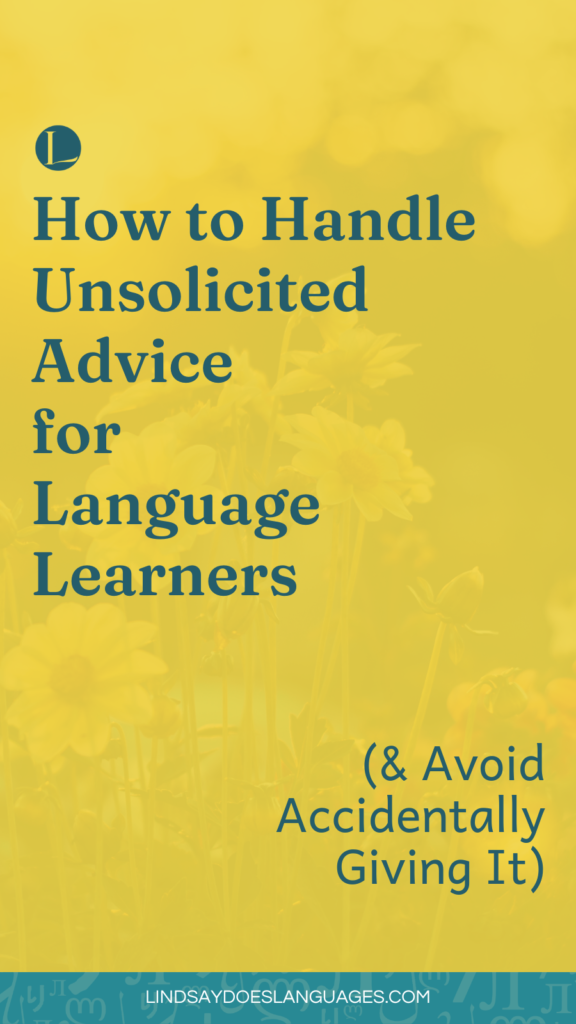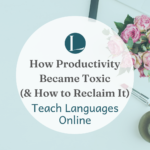September 14th, 2023
How to Handle Unsolicited Advice in Language Learning (& How Not to Give It)
Unsolicited advice in language learning is never fun. So why does it still happen? What can we do in response? Here’s how to handle it & how not to give it.

Before we begin…
The Video
The Podcast
How to Handle Unsolicited Advice in Language Learning (& How Not to Give It)
Unsolicited advice is never fun to receive. It doesn’t make people like you when you give it. And it doesn’t make you feel good when you recieve it. So why is this still a thing? Why do some people feel compelled to correct?
I want to dig into this as thoughtfully as I can in this episode and try to see things from both sides – the person recieving unsolicited advice (this one I can relate to a lot). And the person giving it ( I relate less to this, but I’ll try and be open-minded here).
There’s a few reasons I wanted to talk about this topic.
Firstly, I’m bored of people thinking it’s ok to attempt to correct people’s grammar and waste their time responding to my emails to try and do so.
Language evolves, it changes. I didn’t call 999 for the grammar police. If I need you, I’ll call you.
Secondly, not long before writing this, someone told me about how they were rudely interrupted by someone not in their conversation to correct their grammar and use of language. That sucks that this wasn’t the first time I’ve heard stories like this.
And finally, I’m training for Istanbul Marathon at the time of writing. I’m not immune to having had to respond to sexist, derogatory or condescending comments when doing sport in the past. It sucks, but it makes me stronger. But the same day someone told me about being interrupted, I went for a fast run as part of that training.
There’s this great looking outdoor gym that, I’ll be honest, I’ve always been intimidated to use because mostly when I pass there’s some muscly-looking guys there with their dogs tied on a lead. So I never really get a chance to give it a go.
Well, that morning there was just one guy there so I felt safe enough to give it a go. One minute in – I know this because I ambitiously set my watch to strength training – he came over and tried to show me how I “should” be using the equipment.
I politely told him I was following the graphic on the equipment frame to do a slightly different exercise to what he decided to demonstrate but two and a half minutes in, I stopped my watch and walked away.
I was feeling so angry.
We hadn’t made eye contact, hadn’t said hello, hadn’t smiled at each other.
He must have been watching me to know I was doing it “wrong”. Which is uncomfortable given that this equipment is all facing one direction.
This was a classic example of unsolicited advice.
I don’t like to use the word mansplaining because that unnecessarily genders it, in my opinion. Unsolicited advice givers can come in all genders.
But all of this makes my blood boil. That morning in particular didn’t feel good, which isn’t a fun feeling.
So I wanted to make sure something good comes out of it, which is why I’m talking to you about it here today.
Because unfortunately, this does happen. And it happens with language learning too. And I want to make sure the conversation is open, and we can discuss this without it becoming an A vs B one-side-or-the-other argument.
How unsolicited advice shows up for language learners
People correcting your grammar (when you didn’t ask)
Policing people’s grammar does not make you a good user of the language yourself.
It does not preserve the language the way you’ve grown accustomed to.
It does not encourage more people to give language learning a go.
What it does do is make people feel embarrassed, belittled, unintelligent, patronised, angry.
And I think we can agree that none of these are productive emotions for successful language learning and relationships with fellow humans.
Here’s why it’s actually pointless to correct people’s grammar and language use.
It is inevitable that when a language is used, it will change.
Think about how the most common verbs in a language are always the irregular ones! It’s a pain when we’re learning a language but there’s good reason for it. They’re used all the time so they have more chances to be morphed and adapted into something that flows better, cuts bits out, all of that stuff.
That’s the first point here.
Secondly, there are multiple varieties of every language. They are all valid.
Often when people correct English grammar, for example, what they’re doing is favouring a dominant group variety.
And what this does is diminish the value of lesser known, lesser documented or lesser respected varieties. And often, these people are marginalised groups.
So when you correct people’s language use and it’s unsolicited? You’re, perhaps unintentionally, devaluing an often already devalued language variety.
Sure, sometimes mistakes are just mistakes. A wrong word here and there, grammar use that doesn’t fit with any current language variety. It happens.
But consider this – if you understand it enough to understand what you think the “correct” grammar should be, then you understood it enough.
People suggesting how you should learn a language (when you didn’t ask)
If I’ve said this once, I’ve said it a million times. There’s no one ‘method’ or ‘system’ to successfully learn languages.
You do not necessarily need immersion in a country.
You do not need to choose between comprehensible input and full exposure speaking.
When you see someone share how they’re learning a language, and that it works for them and they’re not asking for advice about what to change?
No unsolicited advice needed. Let them do what is working, even if it’s different to your choices.
People telling you which language to learn (when you didn’t ask)
At first I thought this might be a bit rarer, more of an online thing.
I’ve had countless YouTube comments and emails telling me I should learn this language and that language…
So I figured it’s probably just a consequence of excited native speakers or learners who want to see your experiences with a language they’re familiar with. Ok, I can see that.
But then the more I thought about it, the more I figured people can probably relate to this.
Think about when you tell your second uncle twice removed at that family wedding that you’re learning Quechua.
“Quechua?! Why on earth are you bothering with that?! You should use your skills to learn Chinese – that’s the future!”
And I know this is mostly innocent throwaway comments. But it can add pressure and questioning to a previously content language learner.
Considering why people give unsolicited advice
They’re genuinely trying to be helpful
Perhaps that man at the outdoor gym thought I would hurt myself.
So I have to acknowledge that maybe he was trying to save me from injury.
It doesn’t make it easier to deal with in the moment. It feels embarrassing, patronising and my response in the moment was to leave. Because I didn’t want to be there.
And as I walked away, I couldn’t decide if I was more mad at him for giving his unsolicited advice or more mad at myself for leaving when I had a right to stay there. Probably a bit of both.
But upon reflection when I consider he may have thought he was helpful, it softens it slightly.
They’ve just learnt what they’re sharing recently
It could also be that people are excited to share their unsolicited advice with you because they were making the same (perhaps presumed) mistakes recently too.
To give an unrelated example, when I watched the Baz Luhrmann Romeo & Juliet film for the first time since school, I instantly had to text my sister to tell her that Ross & Monica’s mum from Friends plays Romeo’s mum!
I can understand the urge to share our newly learnt knowledge with others.
They want to be friendly
It isn’t always easy to approach people or make friends in adulthood.
For some people, perhaps this is their skip-the-small-talk way of attempting to do that.
Again, not easy to remember in the moment but I can bring myself to accept that.
How to Respond to Unsolicited Advice
A polite “Thank you but I’m doing it my way.”
This is the easiest way because it typically requires the least follow up.
It’s not rude so doesn’t conflict with our human desire to be kind and save face either.
Let people say what they need to say, thank them briefly, and continue what you were doing.
A deferring topic
To take the spotlight off what you were doing, it can be helpful to defer the conversation to a different topic.
Try a “Thanks. How are you getting on with your language learning?”
Maybe they’ll say “Great! I’m an incredible language genius, which is why I give unsolicited advice because everyone needs to know it.”
But it’s more likely they’ll either keep things brief or it will become a deeper conversation.
Ignore it
What I don’t recommend is responding angrily or aggressively. We never know someone’s circumstances, or what kind of day they’ve had to that point.
I don’t find this a helpful response in most situations.
Instead, if you want to scream back to your unsolicited advice giver, try to ignore it. Perhaps even walking away to allow yourself the time to calm down and not say or do anything you’ll regret.
For example, if we’re talking about responding to an unhelpful comment online, walk away first. Think on your words before responding. You’ll always respond more mindfully with reflection than in the moment when the anger has boiled up.
How to Not Accidentally Give Unsolicited Advice
Consider if it will actively save someone from a risky situation
None of us are immune to accidentally giving unsolicited advice! Yes, even if you feel you’re always on the receiving end of it and would never treat someone else that way. It can happen.
So the first thing to consider when dispensing advice is whether someone is at risk.
That might sound extreme, and in a language learning context, often this makes things trivial! Which is good because then we’ve avoided giving unsolicited advice!
For example, will someone be so dangerously misunderstood if they make a pronunciation mistake? Mostly not.
But if you know that one way of pronouncing that vowel makes it the word they’re going for and the other (the one they’re currently saying) is the worse swear-filled insult possible in that language?
Well yeah, that could be a good one to share.
Consider if it’s relevant & helpful
When someone tells you they’re enjoying and making progress they’re happy with using apps to learn a language, it’s not exactly crucial that they know you read a thing once that said “Apps are trash”.
Keep it to yourself if it won’t help someone.
Ask if someone wants your advice first!
Finally, if you do decide that someone definitely could benefit from your advice, ask if they want it first!
It’s very simple, huh?
That way it’s not unsolicited.
I know it’s difficult to say “no” if someone asks “Can I give you some advice?”.
However, I do find for myself that I’m able to take it with more of a pinch of salt when someone has asked first.
If you want to take it on board it’s easier when you’ve agreed to hear it.
If you don’t, then it’s easier to dismiss without anger or embarrassment.
And as for the advice giver? It feels better knowing you’re not butting in when you’re not wanted.








